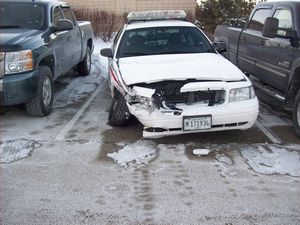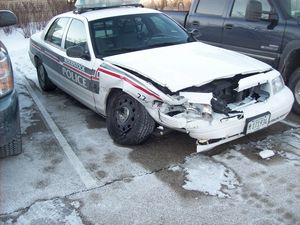|
By accessing or using The Crittenden Automotive Library™/CarsAndRacingStuff.com, you signify your agreement with the Terms of Use on our Legal Information page. Our Privacy Policy is also available there. |

Woodstock Police car - was it hit or did it hit?
|
|---|
|
|
Woodstock Police car - was it hit or did it hit?
Gus Philpott
Woodstock Advocate
January 21, 2011
In Wednesday's crash at Route 47 and Lake Avenue between a Woodstock police car and two other vehicles, the crash was described in a newspaper article in the print edition this way. "The squad car was headed westbound on Lake Avenue while responding to a call for service when it was struck by a 2003 Ford Windstar that was southbound on Route 47." That explanation came from a press release from the McHenry County Sheriff's Department.
Above are photos of the police car, which is typically assigned to Beat 22 (note the number on the fender) and is believed to have been driven by an officer assigned to Beat 22, although his name is not mentioned in the newspaper article and has not yet been released by the Woodstock Police Department.
You decide for yourself. Does it look to you like it "was struck by" another vehicle, or does it appear that it struck another vehicle. Note the extensive front-end damage to the squad car.
Beat 22 is the northwest quadrant of the City, but the squad car was being driven west on Lake Ave. That would be inbound from Beat 24 and well outside Beat 22. Had the officer been assigned to a call in Beat 24, which would explain his being outside his beat?
What was the "call for service" to which the officer was headed with emergency lights and siren in use?
When a City police car is involved in an intersection crash, the citizens are entitled to an explanation, and it should be forthcoming quickly from the police chief. Two days later, there still is no word.
Is there a Department policy for automatic alcohol- and drug-screening following an on-duty accident? It should be a routine step and spelled out in the HR employee manual and the agreement with the union. The assumption, of course, is that an officer on duty has not used drugs or drunk alcohol within a specific period of time before going on duty. But is there a policy?





















